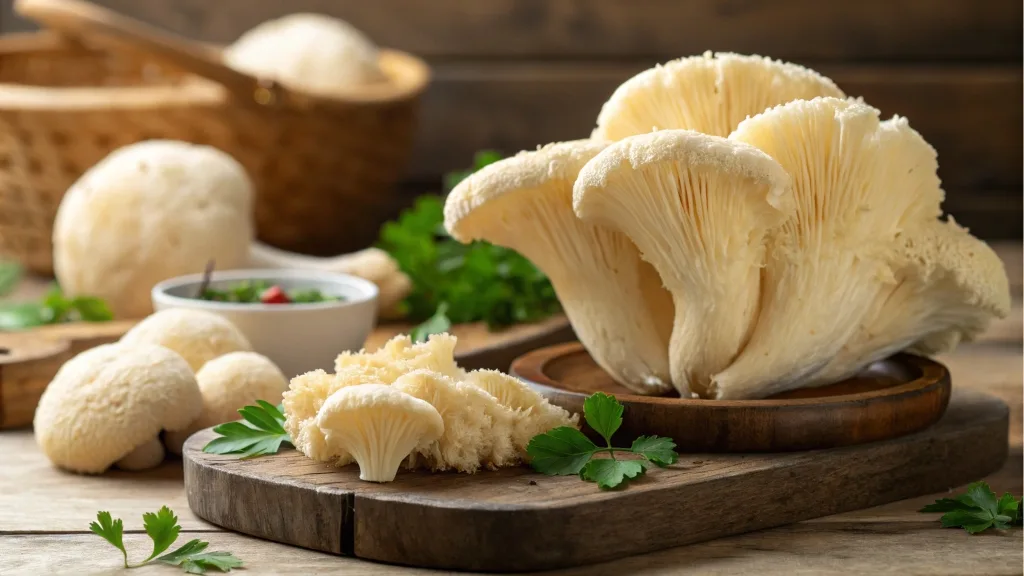Lion’s mane mushrooms are often hailed as a health wonder, promising better memory, sharper focus, and even stronger immunity. But let’s face it—no superfood comes without a little fine print. So, what’s the catch? Are there side effects? Could these fluffy fungi cause more harm than good for some people?
In this article, we’re taking a closer look at what is the downside of lion’s mane. Whether you’re already a fan or thinking of trying it for the first time, it’s worth knowing the full story. From stomach issues to potential allergies, let’s break it all down step by step.
Potential Side Effects of Lion’s Mane Mushroom

Gastrointestinal Discomfort
Ever eaten something new and felt your stomach wasn’t thrilled? Well, lion’s mane mushrooms might do that to some folks. While generally safe, a few people report mild tummy troubles—think nausea, bloating, or even diarrhea. Usually, this happens if you eat too much or try it for the first time.
A simple tip? Start small. A teaspoon of powdered supplement or a tiny portion in your dinner is a good test run. That way, you can figure out if your stomach gives it a thumbs-up.
Allergic Reactions
Here’s the thing: allergies are rare but not impossible. Some people might experience itchy skin, redness, or even difficulty breathing after eating lion’s mane. Yikes, right? If you’ve got a history of mushroom allergies, play it safe and check with your doctor first.
Pro tip: Try a small amount and wait a day or two before going all-in. Better safe than sorry!
Wrapping It Up
While side effects are uncommon, it’s important to listen to your body. Feeling off after eating lion’s mane? It might not be your perfect match. Up next, we’ll dig into how these mushrooms interact with medications—because that’s a whole other story!
Drug Interactions and Contraindications

When it comes to adding supplements or functional foods like lion’s mane mushrooms to your routine, it’s crucial to consider potential interactions with medications. So, what is the downside of lion’s mane when mixed with certain drugs? Let’s explore.
Anticoagulant and Antiplatelet Medications
Lion’s mane mushrooms may have mild blood-thinning effects, which could spell trouble if you’re already on medications like aspirin, warfarin, or other anticoagulants. Combining the two might increase the risk of excessive bleeding—even from something as simple as a minor cut or scrape.
What can you do? If you’re on blood thinners, talk to your doctor before adding lion’s mane to your diet or supplement stack. It’s always better to double-check than to deal with unexpected side effects.
Antidiabetic Medications
Studies suggest lion’s mane might help lower blood sugar levels. Sounds great, right? Well, not so fast. If you’re taking medications to manage diabetes, this effect could potentially cause hypoglycemia (a fancy word for dangerously low blood sugar).
The solution? Keep an eye on your glucose levels, and don’t hesitate to consult with a healthcare professional. They can guide you on whether lion’s mane is a safe addition for you.
Wrapping It Up
While lion’s mane is celebrated for its health benefits, mixing it with certain medications can create issues. Knowing what is the downside of lion’s mane in these cases can help you avoid unwanted surprises. Next, let’s talk about something that doesn’t get enough attention: the quality and safety of the mushrooms themselves.
Quality and Contamination Concerns

Even the healthiest foods can cause problems if they’re not sourced or prepared properly. One of the lesser-known answers to what is the downside of lion’s mane lies in the variability of product quality and the potential for contamination.
Supplement Quality Variability
Here’s the deal: not all lion’s mane products are created equal. Some supplements on the market might contain fillers, additives, or lower-than-advertised doses of the active compounds. Worse yet, some could be mislabeled altogether.
To avoid these pitfalls, look for third-party certifications and lab-tested products. A little research goes a long way toward ensuring you’re getting the real deal.
Potential Contaminants
Wild-harvested mushrooms sound fancy, but they can come with a downside—like exposure to environmental toxins. Mushrooms are known to absorb heavy metals or pesticides from the soil. If you’re not careful about your source, you could be consuming more than just nutrients.
Stick to reputable brands or consider cultivated lion’s mane mushrooms, which are grown in controlled environments. They’re safer and just as delicious!
Wrapping It Up
The quality of lion’s mane mushrooms can make or break your experience. Always choose high-quality products, and don’t be afraid to ask questions about where they come from. Up next, we’ll tackle some important ethical and legal considerations around using this trendy mushroom.
Legal and Ethical Considerations
When exploring the world of lion’s mane mushrooms, it’s not just about health benefits and recipes. There are legal and ethical aspects to consider, especially if you’re thinking about foraging or purchasing these fungi.
Legal Status
In some areas, foraging wild mushrooms, including lion’s mane, is regulated to protect local ecosystems. Overharvesting can lead to the depletion of native species, disrupting the balance of nature. Before heading out with your basket, check local guidelines to ensure you’re not inadvertently breaking any rules.
Sustainability Concerns
Beyond legalities, there’s the ethical side of sustainability. Wild populations of lion’s mane can be vulnerable to overharvesting, which threatens their survival and the health of the environment. Opting for cultivated lion’s mane mushrooms is a more sustainable choice. These are grown under controlled conditions, reducing pressure on wild ecosystems and often providing a safer, contaminant-free product for consumers.
Wrapping It Up
Being mindful of the legal and ethical implications of consuming lion’s mane mushrooms helps protect natural habitats and ensures that these unique fungi remain available for future generations. Next, we’ll discuss considerations for specific groups of people who might need to exercise caution when incorporating lion’s mane into their diets.
Special Populations and Precautions
While lion’s mane mushrooms offer numerous health benefits, certain individuals should approach their consumption with caution. Understanding what is the downside of lion’s mane for specific populations is crucial.
Pregnancy and Breastfeeding
Currently, there’s limited research on the safety of lion’s mane consumption during pregnancy and breastfeeding. Without concrete evidence, it’s wise for expectant or nursing mothers to avoid these mushrooms or consult with a healthcare provider before including them in their diet.
Children and Adolescents
The effects of lion’s mane on children and teenagers haven’t been thoroughly studied. Given this lack of information, it’s prudent to err on the side of caution and refrain from giving lion’s mane supplements or dishes to younger individuals until more data is available.
Individuals with Mushroom Allergies
For those with known mushroom allergies, introducing lion’s mane into the diet could trigger allergic reactions. Symptoms might range from mild (like skin rashes) to severe (such as difficulty breathing). If you have a history of allergies to mushrooms, it’s best to avoid lion’s mane or seek medical advice before trying it.
Wrapping It Up
While lion’s mane mushrooms are generally safe for many, certain groups should exercise caution. Consulting with a healthcare professional can provide personalized advice, ensuring that incorporating lion’s mane into your diet is both safe and beneficial. In the next section, we’ll explore recommended dosages and usage guidelines to help you make informed decisions.
Recommended Dosage and Usage Guidelines
Figuring out how much lion’s mane to take can feel like a guessing game. Too little, and you might not notice any effects. Too much? That’s where the question “What is the downside of lion’s mane?” comes into play. Let’s break it down.
Establishing Safe Dosage
While there’s no universal dosage for lion’s mane mushrooms, studies have typically used doses ranging from 500 to 3,000 milligrams per day in supplement form. For fresh mushrooms, about half a cup cooked is a safe starting point for most people.
However, individual reactions vary, so starting small is key. If you’re new to lion’s mane, try a lower dose and gradually increase it. This helps you monitor how your body reacts without overwhelming your system.
Supplements vs. Whole Mushrooms
Should you go for supplements or fresh mushrooms? Both have their pros and cons. Supplements are convenient, but quality can be hit-or-miss (as we mentioned earlier). Fresh mushrooms offer the full nutritional package but require a bit more prep work.
Whatever you choose, always read the label and stick to the recommended dosage. Overdoing it can lead to mild side effects like an upset stomach or dizziness.
Wrapping It Up
The right dosage of lion’s mane depends on your health needs, tolerance, and method of consumption. When in doubt, consult with a healthcare provider to find what works best for you. Next, we’ll answer some of the most frequently asked questions about lion’s mane mushrooms.
Frequently Asked Questions (FAQs)
Can Lion’s Mane Cause Allergies?
Yes, but it’s rare. If you’re prone to mushroom allergies, lion’s mane might not be your best friend. Symptoms can include rashes, itching, or breathing difficulties. Start with a tiny amount to test your tolerance.
Is It Safe to Take Lion’s Mane Every Day?
For most people, yes! Daily consumption in moderate amounts is generally considered safe. However, if you experience side effects like stomach discomfort or unusual symptoms, it’s time to reassess.
What Are the Long-Term Effects of Taking Lion’s Mane?
Research on long-term use is still limited, so we don’t have a complete picture. While early studies suggest benefits for cognitive health, the lack of data means there could be risks we don’t fully understand yet. Moderation is your best bet.
Can Lion’s Mane Interfere with Medications?
Absolutely. As we discussed earlier, lion’s mane might interact with blood thinners or diabetes medications. Always talk to your doctor if you’re on prescription drugs.
Wrapping It Up
Still wondering “What is the downside of lion’s mane?” These FAQs cover the most common concerns. Remember, while lion’s mane is safe for most, listening to your body and consulting with a healthcare professional can help you enjoy its benefits without worry.
Lion’s Mane in Culinary Applications: Risks to Consider
Lion’s mane mushrooms are celebrated for their culinary versatility, but even in the kitchen, there are a few things to watch out for. So, what is the downside of lion’s mane when used in cooking? Let’s explore.
Overcooking Lion’s Mane
Lion’s mane mushrooms have a delicate, seafood-like texture that can turn rubbery if overcooked. This not only affects the flavor but also their nutritional value. For best results, cook them gently—sautéing or roasting at moderate heat preserves their natural taste and nutrients.
Storage Challenges
These mushrooms don’t last long in the fridge. If stored improperly, they can develop a slimy texture or lose their freshness quickly. To avoid waste, keep them in a paper bag in the refrigerator and use them within a few days.
Cross-Contamination Risks
When preparing lion’s mane alongside other raw ingredients, there’s a small risk of cross-contamination. Always clean your work area and use separate utensils for raw and cooked foods to minimize this risk.
Wrapping It Up
In the kitchen, the biggest downside of lion’s mane mushrooms is the care they require. Handle them gently, store them properly, and avoid overcooking to make the most of their unique qualities.
Final Thoughts: Balancing Benefits and Downsides
Lion’s mane mushrooms are undeniably impressive, offering potential benefits for brain health, immunity, and beyond. But, like anything, they’re not perfect. So, what is the downside of lion’s mane? It comes down to individual tolerance, sourcing concerns, and the occasional kitchen mishap.
For most people, lion’s mane is a safe and tasty addition to meals or a thoughtful supplement. However, if you’re on medications, pregnant, or prone to allergies, you’ll want to proceed with a little extra caution.
It’s also worth considering the environmental and ethical implications of how these mushrooms are harvested. Choosing cultivated varieties over wild-harvested ones can make a positive impact while ensuring consistent quality.
Wrapping It All Up
Lion’s mane mushrooms are a fascinating food with tons of potential, but they’re not without their quirks. By knowing the risks and downsides, you can enjoy them with confidence and avoid any unpleasant surprises. Whether you’re cooking them up or taking them as a supplement, a little knowledge goes a long way.
For more insights into cooking mushrooms, check out our Beginner’s Guide to Cooking Mushrooms. Enjoy experimenting, and happy eating! 🍄
Conclusion: Understanding the Downsides of Lion’s Mane
Lion’s mane mushrooms have gained popularity for their potential health benefits and culinary versatility, but they aren’t without their quirks. While most people can enjoy them safely, it’s essential to be mindful of the possible downsides—like mild digestive issues, drug interactions, or allergic reactions.
Knowing what is the downside of lion’s mane allows you to make informed choices. Whether you’re cooking with these unique fungi or trying them as a supplement, start small, monitor your body’s response, and consult with a healthcare provider if needed.
At the end of the day, lion’s mane mushrooms can be a flavorful and healthful addition to your routine—as long as you’re aware of their limitations. Balance is key, and with a little care, you can enjoy all the good without the bad. Happy cooking and exploring! 🍄

